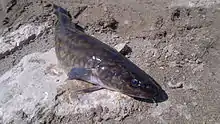mae
'Are'are
References
- Kateřina Naitoro, A Sketch Grammar of 'Are'are: The Sound System and Morpho-Syntax (2013)
Afrikaans
Ingrian

Mae.
Etymology
From Proto-Finnic *madëh. Cognates include Finnish made and Veps madeh.
Pronunciation
- (Ala-Laukaa) IPA(key): /ˈmɑe/, [ˈmɑe̞]
- (Soikkola) IPA(key): /ˈmɑe/, [ˈmɑe̞]
- Rhymes: -ɑe
- Hyphenation: ma‧e
Declension
| Declension of mae (type 6/lähe, t- gradation, gemination) | ||
|---|---|---|
| singular | plural | |
| nominative | mae | matteet |
| genitive | matteen | mattein |
| partitive | maetta | matteita |
| illative | matteesse | matteisse |
| inessive | mattees | matteis |
| elative | matteest | matteist |
| allative | matteelle | matteille |
| adessive | matteel | matteil |
| ablative | matteelt | matteilt |
| translative | matteeks | matteiks |
| essive | matteenna, matteen | matteinna, mattein |
| exessive1) | matteent | matteint |
| 1) obsolete *) the accusative corresponds with either the genitive (sg) or nominative (pl) **) the comitative is formed by adding the suffix -ka? or -kä? to the genitive. | ||
| Soikkola declension of mae (type 6/lähe, t- gradation, gemination) | ||
|---|---|---|
| singular | plural | |
| nominative | mae | mattehet, matteet |
| genitive | mattehen | mattehiin |
| partitive | maetta, maeht |
mattehia |
| illative | mattehesse | mattehisse |
| inessive | mattehees | mattehiis |
| elative | mattehest | mattehist |
| allative | mattehelle | mattehille |
| adessive | matteheel | mattehiil |
| ablative | mattehelt | mattehilt |
| translative | matteheks | mattehiks |
| essive | mattehennä, matteheen |
mattehinnä, mattehiin |
| exessive1) | mattehent | mattehint |
| 1) Obsolete *) the accusative corresponds with either the genitive (sg) or nominative (pl) | ||
Spanish
Pronunciation
- IPA(key): /ˈmae/ [ˈma.e]
- Rhymes: -ae
- Syllabification: ma‧e
Noun
mae m or f by sense (plural maes)
- (Costa Rica, colloquial) dude, guy, man
- Synonyms: tipo; see also Thesaurus:tío
- (Costa Rica, colloquial) girl, gal, sis
- (Costa Rica, colloquial, used in the vocative) dude, you
Welsh
Alternative forms
- ma’ (colloquial)
Pronunciation
- (North Wales, standard) IPA(key): /maːɨ̯/
- (North Wales, colloquial) IPA(key): /ma/, /mə/
- (South Wales, standard) IPA(key): /mai̯/
- (South Wales, colloquial) IPA(key): /ma/, /mə/
- Rhymes: -aːɨ̯
- Homophones: mai, Mai (South Wales)
Verb
mae
- third-person singular present of bod
- Ble mae’r sebon? Mae’r sebon ar y bwrdd.
- Where is the soap? The soap is on the table.
- Mae Dafydd yn dod.
- Dafydd is coming.
- Mae cath wrth y ffenestr.
- There is a cat at the window. / A cat is at the window.
- Mae hi wedi mynd.
- She has gone.
- Mae’r plant yn chwarae.
- The children are playing.
- Mae’r cathod yn sgrapo’r dyn.
- The cats are scratching the man.
- Mae Angharad ac Alun yn magu’r plant yn dda iawn.
- Angharad and Alun are bringing up the children very well.
- Mae Angharad ac Alun wedi magu’r plant yn dda iawn.
- Angharad and Alun have brought up the children very well.
This article is issued from Wiktionary. The text is licensed under Creative Commons - Attribution - Sharealike. Additional terms may apply for the media files.